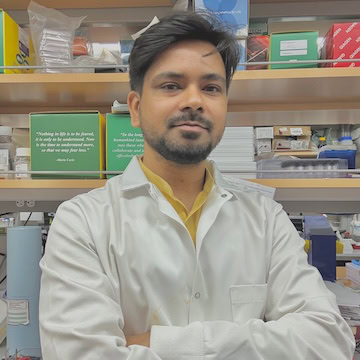Amit Kumar, PhD

Travel Award
$1,500
University of Pittsburgh
Circadian misalignment activates cGAS-STING and NLRP3 inflammasome to drive MASH
Mentor: Vijay Yechoor, MD
Shift work, like night shifts or irregular sleep hours, has been linked to higher risks of obesity and liver diseases such as MASLD (a fatty liver condition) and its more severe form, MASH (which involves liver inflammation and damage). Our study explores how disruptions to the body's internal clock, or “circadian rhythm,” can worsen these liver problems, especially when combined with an unhealthy diet.
To investigate this, we mimicked shift work in mice by changing their day-night light cycles each week, while feeding them either a normal or high-fat diet. Mice on the high-fat diet with disrupted circadian rhythms gained more weight, had higher blood sugar levels, and showed signs of severe liver damage, including fat buildup, immune cell infiltration, and scarring.
We found that this combination of diet and circadian disruption activates a specific immune response in the liver, driven by pathways called the cGAS-STING and NLRP3 inflammasome. This leads to inflammation and a type of cell death known as pyroptosis, which further damages the liver. We also discovered that even just circadian disruption, without a high-fat diet, can trigger inflammation on its own.
Our results suggest that disrupted circadian rhythms significantly worsen liver inflammation and scarring by intensifying immune responses. These findings highlight the importance of maintaining a healthy body clock and open the door to potential therapies that target circadian rhythms to treat or prevent MASH.